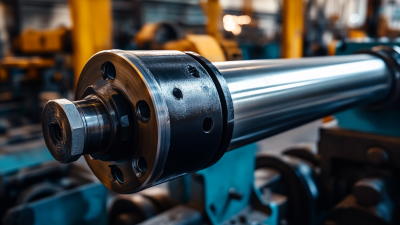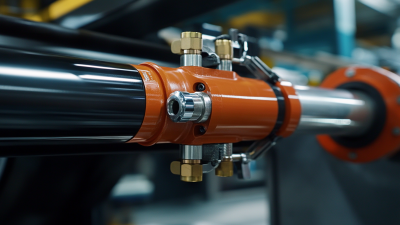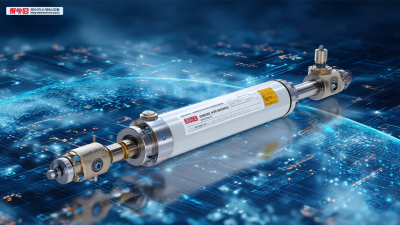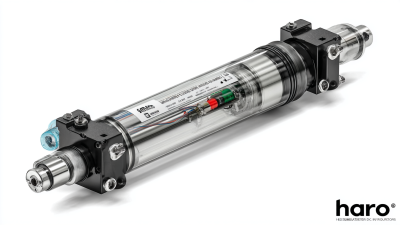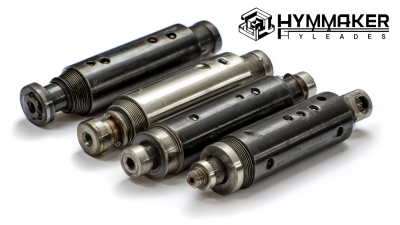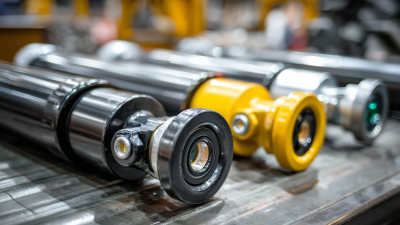In the rapidly evolving world of engineering and automation, the need for advanced solutions has never been greater. Among these innovations, the Smart Hydraulic Cylinder stands out as a game-changer for various industrial applications. Designed to enhance performance, efficiency, and precision, smart hydraulic cylinders integrate cutting-edge technology, enabling real-time monitoring and control that traditional cylinders simply cannot match. As projects become increasingly complex, the advantages of adopting smart hydraulic systems are becoming evident, particularly in terms of improved productivity and reduced operational costs. This ultimate guide explores the top ten reasons to choose Smart Hydraulic Cylinders for your next project, highlighting their unique features and benefits that can propel your operations into the future. Whether you are involved in manufacturing, construction, or any other sector relying on hydraulic systems, understanding the power of smart technology could be the key to your success.

In the realm of modern engineering, smart hydraulic cylinders are revolutionizing the way mechanical systems operate. These advanced cylinders are equipped with integrated sensors and control systems, allowing for real-time feedback and data analysis. This capability significantly enhances performance, enabling engineers to monitor the health of the equipment and make informed decisions based on accurate metrics. As a result, smart hydraulic cylinders can lead to improved efficiency, reduced downtime, and lower operational costs.
Moreover, the adaptability of smart hydraulic cylinders makes them ideal for a variety of applications. They can easily integrate with existing systems, providing seamless upgrades without the need for comprehensive redesigns. This flexibility is particularly beneficial in industries where precision and reliability are paramount. Additionally, the data generated by smart cylinders fosters predictive maintenance, reducing the likelihood of unexpected failures and extending the lifespan of machinery. Overall, the benefits of smart hydraulic cylinders are undeniable, positioning them as a crucial component in modern engineering projects.
This chart illustrates the benefits of smart hydraulic cylinders in modern engineering, highlighting key advantages that can enhance performance and efficiency.
The demand for smart hydraulic cylinders is on the rise, driven by the need for reliable motion control solutions that enhance productivity and operational efficiency across various industries. As projected, the global hydraulics market is set to grow from USD 39.40 billion in 2025 to USD 44.26 billion by 2030, indicating a strong market interest in advanced hydraulic technologies. Smart hydraulic cylinders embody innovative features such as integrated sensors and data analytics capabilities, which not only optimize performance but also facilitate predictive maintenance. These cylinders can adapt to changing load conditions in real-time, enhancing the overall efficiency of hydraulic systems.
Moreover, recent innovations in this field are being highlighted in major industry events, showcasing the continuous efforts to push the boundaries of hydraulic technology. For instance, a novel linear displacement transducer introduced in smart cylinders enhances precision control, making them an ideal choice for applications requiring high reliability.
As industries increasingly pursue automation and smarter solutions, the transition towards adopting smart hydraulic cylinders becomes even more critical, representing a transformative step in hydraulic performance and efficiency.
When considering hydraulic solutions for your next project, cost-effectiveness is a crucial factor that can significantly impact your bottom line. Recent industry reports indicate that smart hydraulic cylinders can reduce operational costs by as much as 30% compared to traditional systems. By integrating advanced monitoring and control technologies, these cylinders allow for real-time condition tracking and maintenance alerts, minimizing downtime and unexpected repair expenses. As a result, businesses can enjoy a more efficient allocation of resources, leading to substantial long-term savings.

Moreover, the initial investment in smart hydraulic technology can be mitigated by the enhanced efficiency and lifespan of these systems. According to a study by the National Fluid Power Association, companies that adopted smart hydraulics experienced an average increase in equipment longevity by 25%. This longevity not only reduces the frequency of replacements but also contributes to lower energy consumption and waste, further enhancing the cost-effectiveness of smart hydraulic solutions. As industries increasingly shift towards automation and intelligent systems, the financial benefits of choosing smart hydraulic cylinders become even more evident, ensuring that your project not only meets immediate needs but also secures a sustainable future.
When it comes to hydraulic cylinders, the choice between traditional and smart options can significantly impact the efficiency and effectiveness of your project. Traditional hydraulic cylinders, while reliable, often lack the advanced features that modern applications require. These conventional systems depend largely on manual adjustments and routine maintenance, which can lead to delays and increased operational costs. In contrast, smart hydraulic cylinders incorporate sophisticated sensors and IoT technology that allow for real-time monitoring and data collection, enhancing performance and reliability.
Smart hydraulic cylinders are designed to offer higher precision and adaptability compared to their traditional counterparts. They can automatically adjust pressure, speed, and stroke length based on the demands of the application. This level of automation not only optimizes efficiency but also reduces the risk of wear and failure, ultimately extending the lifespan of the equipment. Furthermore, the ability to collect and analyze data helps engineers anticipate maintenance needs, minimizing downtime and ensuring continuous operation. As industries evolve and the demand for smart solutions grows, choosing smart hydraulic cylinders is not just a trend but a strategic move toward achieving superior operational performance.

Integrating smart hydraulic cylinders into your next project requires careful consideration of several key factors that can significantly influence the success and efficiency of your operations. One of the primary considerations is the compatibility of these advanced systems with existing machinery and controls. It’s essential to evaluate whether your current setup can accommodate smart technology without extensive modifications, ensuring a seamless integration process.
Another vital aspect to consider is the scalability of smart hydraulic cylinders. As projects evolve, the demands on hydraulic systems can vary significantly. Choosing cylinders that can be easily adjusted or upgraded to handle increased loads or different tasks will provide your project with the flexibility it needs for future growth. Additionally, understanding the data analytics capabilities offered by smart hydraulic cylinders can enhance performance monitoring and predictive maintenance, ultimately leading to lower downtime and increased productivity. Emphasizing these factors during the planning phase can help secure long-term benefits and optimize the efficiency of your hydraulic systems.
